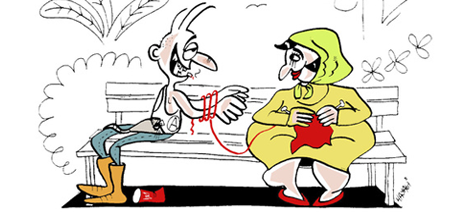
Hayati Boyacıoğlu is a Turkish-German cartoonist. His cartoons frequently deal with issues of integration and cultural relations.
Hayati, in the past weeks you posted several cartoons showing couples – most of them very unlikely ones. Where did that come from?
![]() You will see couples anywhere you go – on the subway, at a doctor’s office.. That’s when I start wondering what they do, what they tell each other, how they found each other, why him, why her… There’s hardly any subject more rewarding for a cartoonist than relationships.
You will see couples anywhere you go – on the subway, at a doctor’s office.. That’s when I start wondering what they do, what they tell each other, how they found each other, why him, why her… There’s hardly any subject more rewarding for a cartoonist than relationships.
Was there any particular couple that started the whole thing?
Yes. Back in 1995 I published a book that had a couple on the cover page – a punk and a Turkish woman with a headscarf. I saw those two sitting on a bench at Moritzplatz. In a city like Berlin these kinds of things are actually quite frequent.
You make up names for all of your couples…
Yes, but I only started doing this recently. It adds a certain warmth to a cartoon. I also want to add a common element to my couple drawings: it’s meant to show that we are all human beings, even though some people have a hard time accepting that.
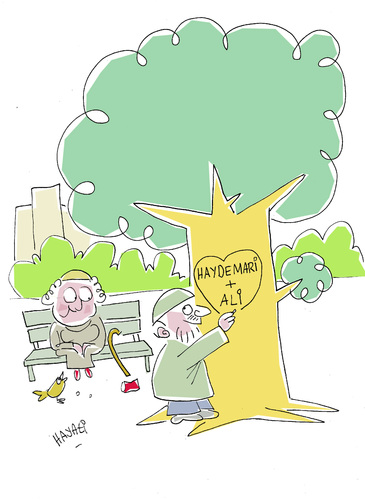 For example, I did this cartoon about “Heidemarie and Ali”. In that one Ali cuts both their names into a tree. These kinds of things just have to happen if you take into account that the first Turkish migrants came to Germany in 1960. It’s well possible that a Turkish man who arrived back then fell in love with a German. But in everyday life you see these things way too rarely.
For example, I did this cartoon about “Heidemarie and Ali”. In that one Ali cuts both their names into a tree. These kinds of things just have to happen if you take into account that the first Turkish migrants came to Germany in 1960. It’s well possible that a Turkish man who arrived back then fell in love with a German. But in everyday life you see these things way too rarely.
You were born in Istanbul and your wife is from Bremerhaven. Does you own experience influence your couple cartoons in any way?
Sure. We have known each other since 1978, when she was 14 and I was 17. I asked her to teach me German… She still does.
You also do political cartoons, say, about famine in Somalia..
There is a kind of scheme behind that. I will draw a number of “bourgeois feelgood cartoons” and then I will do one about starving Somalian children.
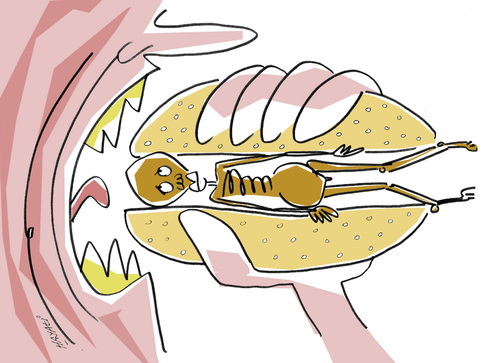 Do you draw it in that order or do you keep back the grisly ones to use them in the proper moment?
Do you draw it in that order or do you keep back the grisly ones to use them in the proper moment?
Sometimes I think about trying to control this.. but there’s no real need to. Life does that by itself. I will draw something about couples switching clothes and all of a sudden my routine is interrupted by a sinking ship with 20 refugees aboard and other people doing nothing. You just have to draw something about that.
Is there any agenda behind your cartoons?
Dario Fo once said that if you want to make people understand something you have to make them laugh. Because that’s when their brains will open up and you can add knowledge.
The problem with toonpool.com is that the audience is composed of artists, of satirists. There’s no need to teach each other. On Facebook, for example, I will get very different reactions to my cartoons.
Several of your political cartoons deal with Turkish issues, for example with the recent elections. Can you tell a bit about Turkish cartoons in general?
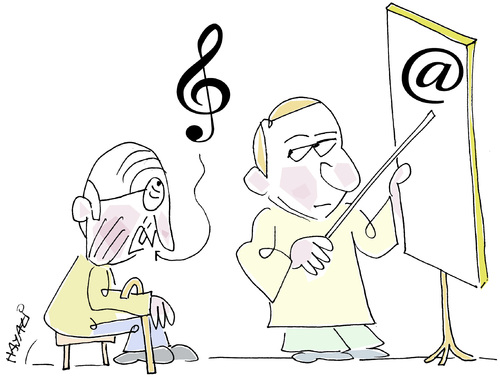 In Turkey, the newspapers’ headquarters are mostly based in Istanbul. Except for about four pages of the international issues, everything’s produced there.
In Turkey, the newspapers’ headquarters are mostly based in Istanbul. Except for about four pages of the international issues, everything’s produced there.
So, those international issues will hardly produce their own editorial cartoons. Perhaps because it’s hard to control editorial cartoons. In effect, most editorial cartoons deal with Istanbul issues and hardly ever with things happening anywhere else.
Are there any differences to German cartoons when it comes to humor?
Yes. There are basically two types. The first one does not really exist in Germany. It’s satirical magazines that are very cheap. Examples would be Leman or the now-defunct Gırgır.
German Titanic or Eulenspiegel cost 4 Euros each and, if you want to understand them you have to be well-read, know a thing or two about satire, etc. It’s not for everyone.
The Turkish magazines cost something like 25 cents and they are not too “high-brow”. Satire should be folksy and accessible for everyone – populist in a good way. I am trying to keep things simple, even though it doesn’t always work. Maybe that’s a point where I’m influenced by Germany.
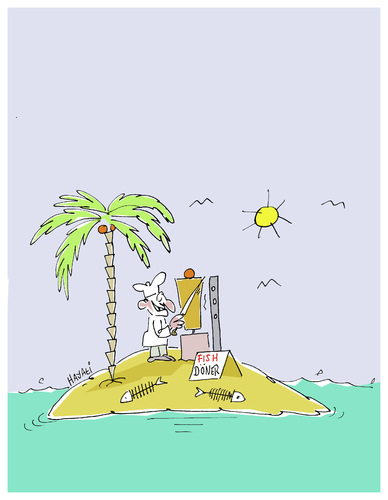 Isn’t there a danger that populist cartoons can very quickly turn to propaganda?
Isn’t there a danger that populist cartoons can very quickly turn to propaganda?
I don’t think so. Readers would notice this very quickly. And they will punish magazines by simply not buying them the following week.
How about the second type of cartoons?
Those are more artistic and don’t use captions. That’s one thing that sometimes poses problems for cartoonists from Yugoslavia, Romania, Bulgaria, and the like. Germans always use captions. Even on toonpool.com you need to fill in a title but, you know, the drawings are supposed to speak for themselves.
Where is this type usually published?
Artists will publish books or display them at exhibitions. There were a couple of more sophisticated satire magazines, but those never really worked.
Are you still in contact with cartoonists from Turkey?
Yes, I am. Thanks to toonpool.com, among others. I started drawing back in school, when Gırgır was still around [editor's note: Gırgır was originally published between 1972 and 1989].
I met a lot of like-minded people then. Some of them – like Erdogan Karayel - I met again in Germany. Others I found online. And, of course, I met a lot of new people.
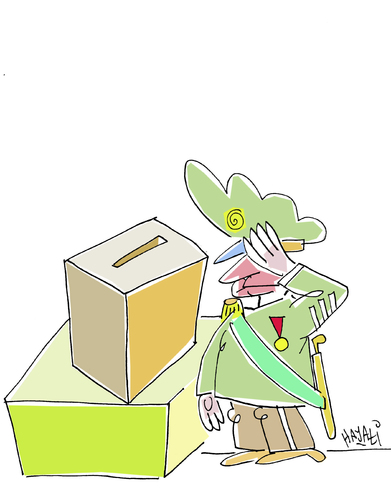 What are the main differences in opinion between “exiles” and artists back in Turkey?
What are the main differences in opinion between “exiles” and artists back in Turkey?
It always depends on how long you have been abroad. If you left only two or three years ago you can live here as you would have back in Turkey. You don’t really speak the language and you can stay at home and watch Turkish television. If you have been here for 20 or 30 years, though, if you keep your eyes open, you will change.
Which of your own attitudes, would you say, have changed?
I see some things differently. Some things that would be taboo over there, I don’t really mind anymore. When the Turkish military’s chiefs of staff resigned, mine was one of very few cartoons on this topic.. and it applauded the fact that they gave in to the power of the people. I hardly got any reactions on that one from Turkey.
Thanks for your time!
]]>